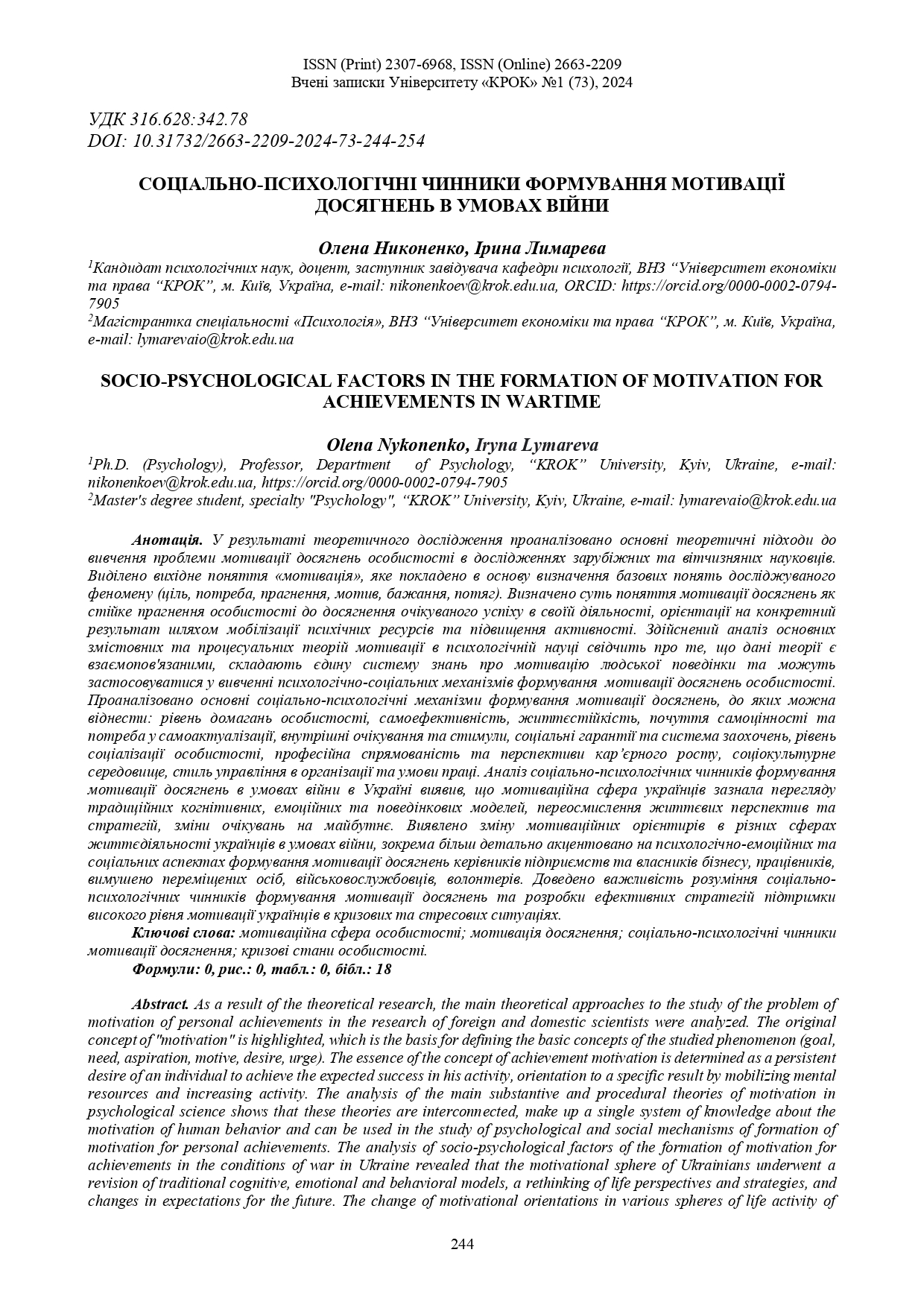SOCIO-PSYCHOLOGICAL FACTORS IN THE FORMATION OF MOTIVATION FOR ACHIEVEMENTS IN WARTIME
DOI:
https://doi.org/10.31732/2663-2209-2024-73-244-253Keywords:
motivational sphere of personality, achievement motivation, socio-psychological factors of achievement motivation, crisis states of personalityAbstract
As a result of the theoretical research, the main theoretical approaches to the study of the problem of motivation of personal achievements in the research of foreign and domestic scientists were analyzed. The original concept of "motivation" is highlighted, which is the basis for defining the basic concepts of the studied phenomenon (goal, need, aspiration, motive, desire, urge). The essence of the concept of achievement motivation is determined as a persistent desire of an individual to achieve the expected success in his activity, orientation to a specific result by mobilizing mental resources and increasing activity. The analysis of the main substantive and procedural theories of motivation in psychological science shows that these theories are interconnected, make up a single system of knowledge about the motivation of human behavior and can be used in the study of psychological and social mechanisms of formation of motivation for personal achievements. The analysis of socio-psychological factors of the formation of motivation for achievements in the conditions of war in Ukraine revealed that the motivational sphere of Ukrainians underwent a revision of traditional cognitive, emotional and behavioral models, a rethinking of life perspectives and strategies, and changes in expectations for the future. The change of motivational orientations in various spheres of life activity of Ukrainians in the conditions of war was revealed, in particular, the psychological, emotional and social aspects of the formation of motivation for the achievements of enterprise managers and business owners, employees, forcibly displaced persons, military personnel, and volunteers were emphasized in more detail. The importance of understanding the socio-psychological factors of the formation of achievement motivation and the development of effective strategies for maintaining a high level of motivation of Ukrainians in crisis and stressful situations is proven.Downloads
References
Бех, І. Д. (2011) Я як джерело духовного саморозвитку особистості. Педагогіка і психологія. № 3. 72 с.
Карамушка, Л. (2022) Психічне здоров’я персоналу організацій в умовах війни: основні вияви та ресурси. Вчені записки Університету «КРОК». 3(67), 124–133. https://doi.org/10.31732/2663-2209-2022-67-124-133
Клевака, Л. П., Горбенко, Ю. Л. (2022) Синдром відкладеного життя у стресових умовах війни. Психолого-педагогічні координати розвитку особистості: зб. наук. матеріалів ІІІ Міжнар. наук.-практ. конф. Національний університет імені Юрія Кондратюка (Полтава, 2-3 червня 2022 р.). Полтава. 105–109.
Когут, І. В. (2022) Аналіз факторів мотивації, які впливають на команди в інноваційних проєктах під час кризи та війни. Економіка та суспільство. URL: https://economyandsociety.in.ua/index.php/journal/article/view/1456/1401
Мащак, С. (2022) Криза особистості в умовах війни: теорія і рефлексія досвіду. Матеріали І Міжнародної науково-практичної конференції «Психологічний супровід до, під час та після війни: дослідження та ділення досвідом», присвяченої Всесвітньому дню психічного здоров’я та Дню Захисників та Захисниць України (Львів, 14–15 жовтня 2022 р.). Львів. 94 с.
Меленчук, Н. І., Лесніченко, Т. Ю. (2022) Прояви самооцінки особистості у осіб з різною мотивацією досягнення. Диференціальний підхід у дослідженні професійного самоздійснення особистості: матеріали Всеукраїнської науково-практичної конференції, 24–25 березня. 46–54.
Никоненко, О., Шевченко, А. (2023) Практичні аспекти зміцнення психологічного благополуччя підприємців в умовах війни. Вчені записки Університету "КРОК". № 3(71). 159–168.
Орбан-Лембрик, Л. Е. ( 2003) Психологія управління : посібник. Київ : Академвидав, 568 с.
Сингаївська, І., Гура, Г. (2023) Психологічні особливості ухвалення рішень керівниками бізнесу в ситуації невизначеності. Організаційна психологія. Економічна психологія. 2–3 (29), С. 95–111.
Страмоусова, І. Є., Сингаївська, І. В. (2023) Теоретичний аналіз проблеми життєстійкості особистості. Держава, регіони, підприємництво: інформаційні, суспільно-правові, соціально-економічні аспекти розвитку: тези доповідей V Міжнародної конференції Університет "КРОК" (Київ, 7 грудня 2023 р.). Київ: https://conf.krok.edu.ua/SRE/SRE-2023/paper/view/1760.
Єременко, А., Безрукова, О. (2023) Характеристика волонтерського руху та мотивація волонтерів в умовах російсько-української війни (за результатами якісного дослідження). Соціологічні студії. С. 26–37. https://doi.org/10.29038/2306-3971-2023-02-22-22
Atkinson, J. M. (1964) An introduction to motivation. J.M. Atkinson. N.Y. : van Nostrand. 344 р.
Bandura, A. (1982) Self-efficacy mechanism in human agency. American Psychologist. 37. 122–147.
Berlyne, D. E. (1963) Motivational problems raised by exploratory and epistemic behavior. In S.Koch (Ed.) Psychology: a study or a science. New York: McGraw-Hill.
Heckhausen, H., Brunstein, J. C. (2018) Leistungsmotivation. Motivation und Handeln, 2018. 163-221.
Kirchler, E., Rodler, Ch., Holzl, E., Meier, K. (2013) Conflict and decision making in close relationships: Love, money and daily routines. Psychology Press.
Malone, T., Lepper, M. (1987) Making learning fun: A taxonomy of intrinsic motivations of learning. Snow R., Farr M. (Eds.). Aptitude, learning, and instruction. New York: Lawrence Erlbaum Vol. 3. P. 223.
McClelland, D. C. (2010) Assessing Individual Differences in Achievement Motivation with the Implicit Association Test: Predictive Validity of a Chronometric Measure of the Self-Concept ‘‘Me=Successful’’. Implicit motives, Р. 151.

Downloads
Published
How to Cite
Issue
Section
License

This work is licensed under a Creative Commons Attribution-NonCommercial 4.0 International License.

